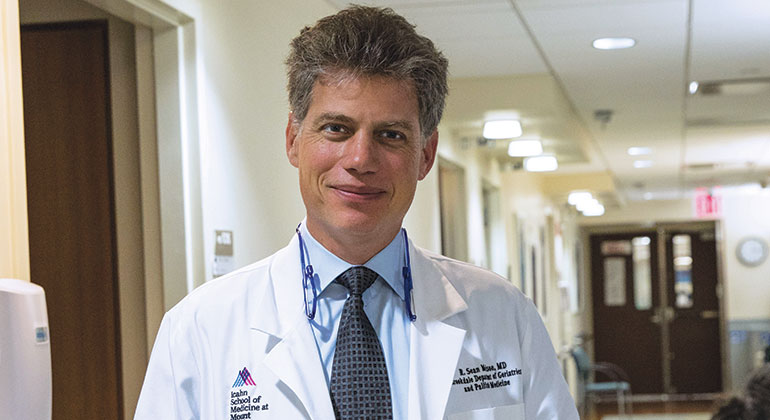Mount Sinai Health System Receives Waiver From Centers for Medicare & Medicaid Services (CMS) to Scale Up Hospitalization at Home
Program can now enroll more Medicare benificiaries
The U.S. Centers for Medicare & Medicaid Services (CMS) announced today that the agency had approved a waiver allowing Mount Sinai Health System to enroll a broader group of Medicare patients into its Hospitalization at Home (HaH) program. The move is a game changer as hospitals in New York City brace for a continued increase in COVID-19 cases.
“The CMS has taken an extraordinary step today, facilitating the rapid expansion of Mount Sinai’s Hospitalization at Home program, an innovative care model with proven results. This means we can significantly scale up hospital-level services in the home, while enhancing hospital capacity for a potential surge,” says Kenneth L. Davis, MD, President and Chief Executive Officer of Mount Sinai Health System.
The concept of “hospitalization at home” has received widespread attention during the pandemic as concerns about the vulnerability of older Americans have mounted. With this home-based care model, patients receive hospital-level services in the safety and comfort of their home, reducing their risk of being exposed to COVID-19.
Mount Sinai Health System was one of the earliest adopters of the concept, and one of the first to prove that it works. In 2018, Mount Sinai researchers led by Albert Siu, MD, MSPH, reported in JAMA Internal Medicine that both clinical outcomes and patient experiences were vastly improved with hospitalization at home care, resulting in shorter length of stay; reductions in hospital readmissions, emergency department visits, and transfers to skilled nursing facilities; and improved patient experience versus traditional inpatient care. The study was funded by a Health Care Innovation Award from the Center for Medicare & Medicaid Innovation (CMMI) and The John A. Hartford Foundation.
“While we were collecting this critical evidence base, we started to work closely with CMS and provide input on the model and how it could be leveraged more broadly and more strategically,” says Dr. Siu, Chair Emeritus of the Brookdale Department of Geriatrics and Palliative Medicine at the Icahn School of Medicine at Mount Sinai. “We were able to bring hospital-level services into the homes of our patients throughout New York City, but the one obstacle we faced was, how do we pay for this? To facilitate widespread adoption, we needed a mechanism of reimbursement that would capture a larger portion of the Medicare population.”
During the peak of the pandemic, Mount Sinai’s Hospitalization at Home, a joint venture with Contessa Health, a Nashville-based health care company that manages acute care services at home, ramped up its services, reaching a critical milestone: admitting its 1,000th patient.
“The pandemic propelled the program’s momentum forward in March when patient beds became scarce. Our team jumped in to help, as we moved inpatients to their homes, while freeing up much-needed beds. Previously our patient population was limited to adults who showed up in our emergency department,” says Linda V. DeCherrie, MD, Professor of Geriatrics and Palliative Medicine, Icahn School of Medicine at Mount Sinai, and Clinical Director of Mount Sinai at Home, which includes Hospitalization at Home and Mount Sinai Visiting Doctors.
“An equally important driver in the program’s acceleration is the patients themselves. I rarely meet a hospitalized patient who prefers to stay in hospital when the alternative of home care is available. Patients, and their families, love this program,” says Dr. DeCherrie.
While collaborating closely with CMS, Drs. DeCherrie and Siu co-lead the Hospital at Home Users Group, alongside Bruce Leff, MD, Professor of Medicine, Johns Hopkins University School of Medicine, where he directs the Center for Transformative Geriatric Research, and David M. Levine, MD, a practicing general internist and clinical investigator at Brigham Health and Harvard Medical School, who directs Brigham’s home hospital program.
The Hospital at Home Users Group is a collaborative of Hospital at Home programs that works with other home-based care models to develop standards and inform regulatory and reimbursement policies necessary to spread this hopeful model broadly throughout North America.
About the Mount Sinai Health System
Mount Sinai Health System is one of the largest academic medical systems in the New York metro area, with 48,000 employees working across seven hospitals, more than 400 outpatient practices, more than 600 research and clinical labs, a school of nursing, and a leading school of medicine and graduate education. Mount Sinai advances health for all people, everywhere, by taking on the most complex health care challenges of our time—discovering and applying new scientific learning and knowledge; developing safer, more effective treatments; educating the next generation of medical leaders and innovators; and supporting local communities by delivering high-quality care to all who need it.
Through the integration of its hospitals, labs, and schools, Mount Sinai offers comprehensive health care solutions from birth through geriatrics, leveraging innovative approaches such as artificial intelligence and informatics while keeping patients’ medical and emotional needs at the center of all treatment. The Health System includes approximately 9,000 primary and specialty care physicians and 11 free-standing joint-venture centers throughout the five boroughs of New York City, Westchester, Long Island, and Florida. Hospitals within the System are consistently ranked by Newsweek’s® “The World’s Best Smart Hospitals, Best in State Hospitals, World Best Hospitals and Best Specialty Hospitals” and by U.S. News & World Report's® “Best Hospitals” and “Best Children’s Hospitals.” The Mount Sinai Hospital is on the U.S. News & World Report® “Best Hospitals” Honor Roll for 2024-2025.
For more information, visit https://www.mountsinai.org or find Mount Sinai on Facebook, Instagram, LinkedIn, X, and YouTube.
